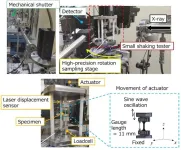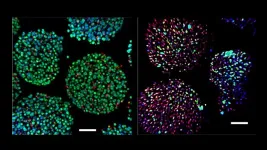(Press-News.org) The National Science Foundation (NSF) has awarded a $2 million grant through its Emerging Frontiers in Research Initiatives (EFRI) program to investigators at the UTSA MATRIX AI Consortium for Human Well-Being for research that will help bridge the gap between human brain processing efficiency and the limitations of current artificial intelligence (AI) models.
This endeavor seeks to create a new form of AI that rapidly learns, adapts to and operates in uncertain conditions, all while effectively addressing the energy challenge plaguing modern AI.
Dhireesha Kudithipudi, the McDermott Endowed Chair in the Department of Electrical and Computer Engineering at UTSA and founding director of MATRIX AI, is the principal investigator (PI) for the project. Her co-PIs include Christopher Kanan (University of Rochester), Garrett Rose (University of Tennessee, Knoxville), John Basl(Northeastern University) and Itamar Lerner, an assistant professor in the UTSA Department of Psychology.
“This $2 million grant for pioneering research represents a significant step toward unlocking the potential of AI, aligning it with the efficient temporal learning principles of the human brain,” said Eric Brey, interim dean of the Margie and Bill Klesse College of Engineering and Integrated Design at UTSA. “The implications are vast, promising a future where AI systems are not only efficient but also adaptive and lifelong learners, revolutionizing industries and benefiting society at large.”
The team will draw ideas from the Temporal Scaffolding Hypothesis, a theory that mirrors the human brain's ability to process temporal patterns during both wakefulness and sleep. Unlike contemporary AI models, the human brain is great at doing lots of different things and handling information relating to different time frames, all while exerting very little energy. This stark contrast serves as the driving force behind the quest to create AI models that can emulate the human brain's adaptability and efficiency.
According to the hypothesis, our brains are good at understanding patterns by replaying our daily experiences quickly while we sleep. The research team wants to create computer systems that work similarly, helping us solve complex problems efficiently. These systems could be used in important areas like health care, self-driving technology and national security.
"This research will help create new computer programs that quickly simulate and understand our past experiences in a simpler way. By combining brain science ideas and real-life experiments, we can test and improve how these computer programs work, changing the way we study them,” Kudithipudi said. “Copying how our brain learns about time helps AI require less power, which is a big issue in today's AI technology."
"We are all very proficient in detecting temporal patterns, even when we are not expecting them,” added Lerner. “For example, think about when you first realized that the number of times a church bell rings tells the current hour. This project aims to explore the possibility that sleep helps us capture such non-trivial patterns and attempts to implement it in AI systems through machine learning thus pushing forward the AI landscape informed by neuroscientific principles."
In addition to advancing AI technology, this project seeks to empower the future workforce in artificial intelligence. The team is committed to providing new training opportunities for underrepresented students in AI fields and fostering a competitive AI workforce to maintain the nation’s leadership and competitiveness in science, technology, engineering and mathematics (STEM).
END
UTSA MATRIX AI Consortium receives $2 million to make AI more efficient
Researchers will bridge the gap between human brain processing efficiency and limitations of current AI models
2023-11-09
ELSE PRESS RELEASES FROM THIS DATE:
Incheon National University researchers push the limits of gas sensing technology
2023-11-09
The world has become increasingly industrialized over the past few centuries, bringing all sorts of technology and conveniences to the masses. However, workers in industrial environments are often at the risk of exposure to many dangerous gases, such as nitrogen dioxide (NO2). Inhaling this gas can lead to serious respiratory diseases like asthma and bronchitis, and severely compromise the health of industrial workers. Constant monitoring of NO2 levels is thus needed to ensure a safe workplace.
To help with this, many types of selective gas sensors have been developed using different ...
Understanding the dynamic behavior of rubber materials
2023-11-09
Rubber-like materials, commonly used in dampeners, possess a unique property known as dynamic viscoelasticity, enabling them to convert mechanical energy from vibrations into heat while exhibiting spring-like and flow-like behaviors simultaneously. Customization of these materials is possible by blending them with compounds of specific molecular structures, depending on the dynamic viscosity requirements.
However, the underlying mechanisms behind the distinct mechanical properties of these materials remain unclear. A primary reason for this knowledge gap has been the absence of a comprehensive system capable of simultaneously ...
Allergic responses to common foods could significantly increase risk of heart disease, cardiovascular death
2023-11-09
EMBARGOED UNTIL 9:05 A.M. UTC ON NOV. 9, 2023
Sensitivity to common food allergens such as dairy and peanuts could be an important and previously unappreciated cause of heart disease, new research suggests – and the increased risk for cardiovascular death includes people without obvious food allergies.
That increased risk could be comparable to – or exceed – the risks posed by smoking, as well as diabetes and rheumatoid arthritis, the researchers report.
UVA Health scientists and their collaborators looked at thousands of adults over time and found that people who produced antibodies in ...
Antibodies to cow’s milk linked to increased risk of cardiovascular death
2023-11-09
Sensitivity to common food allergens such as cow’s milk and peanuts could be an important and previously unappreciated cause of heart disease, new research suggests – and the increased risk for cardiovascular death includes people without obvious food allergies.
In a paper published in The Journal of Allergy and Clinical Immunology that describes analyses led by Corinne Keet, M.D., Ph.D., pediatric allergy and immunology professor in the UNC Department of Pediatrics of two longitudinal studies, the authors show that the people who produced IgE antibodies to cow’s milk and other foods were at significantly increased risk of cardiovascular mortality. This was true even ...
Palaeo-CSI: Mosasaurs were picky eaters
2023-11-09
Joint press release Utrecht University and Natural History Museum Maastricht
The cradle of palaeontology – the study of fossil remains of animals and plants – lies in the Maastricht limestones, where the first Mosasaurus was discovered in 1766. The Dutch-Belgian border area around the Limburg capital is one of the best-explored areas in the world where Cretaceous rocks are concerned, the era that came to an abrupt end 66 million years ago. New data can now be added to all previous knowledge: the Maastricht mosasaurs turned out to be quite picky in their choice of diet. This ...
AI algorithm developed to measure muscle development, provide growth chart for children
2023-11-09
Leveraging artificial intelligence and the largest pediatric brain MRI dataset to date, researchers have now developed a growth chart for tracking muscle mass in growing children. The new study led by investigators from Brigham and Women’s Hospital, a founding member of the Mass General Brigham healthcare system, found that their artificial intelligence-based tool is the first to offer a standardized, accurate, and reliable way to assess and track indicators of muscle mass on routine MRI. Their results were published today in Nature Communications.
“Pediatric cancer patients often struggle with low ...
A breath of fresh air keeps drug-producing cells alive longer
2023-11-09
Cell-based therapies show promise for drug delivery, replacing damaged tissues, harnessing the body’s own healing mechanisms and more
But keeping cells alive to produce therapies has remained a challenge
Researchers used a smart, energy-efficient version of water splitting to produce oxygen for these cells
New approach maintains cells in vitro and in vivo, showing promise for both acute and chronic applications
EVANSTON, Ill. — In 2021, a Northwestern University-led research team received a Defense Advanced Research Projects Agency (DARPA) contract worth up to $33 million to develop an ...
Smartphones and smart speakers may be able to detect alcohol intoxication by analyzing voice patterns: Study
2023-11-09
By Kimberly Flynn
PISCATAWAY, NJ—Sensors in smartphones and smart speakers could help determine a person’s level of alcohol intoxication based on the changes in their voice, according to a new study in the Journal of Studies on Alcohol and Drugs.
Researchers at Stanford Medicine and the University of Toronto conducted a small study of 18 adults ages 21 and up. Participants were given a weight-based dose of alcohol and randomly assigned a series of tongue twisters—one before drinking, and one each hour up to seven hours after drinking.
The participants were asked to read the tongue twister aloud, and a smartphone was placed on a table withing ...
Forests with multiple tree species are 70% more effective as carbon sinks than monoculture forests
2023-11-09
To slow the effects of climate change, conserve biodiversity, and meet the sustainable development goals, replanting trees is vital. Restored forests store carbon within the forest’s soil, shrubs, and trees. Mixed forests are especially effective at carbon storage, as different species with complementary traits can increase overall carbon storage. Compared to single-species forests, mixed forests are also more resilient to pests, diseases, and climatic disturbances, which increases their long-term carbon storage potential. The delivery of other ecosystem services is also greater in mixed species forests, and they support higher levels of biodiversity.
Although the benefits ...
Umbilical cord milking appears to be safe in preterm infants born after 28 weeks
2023-11-09
WHAT:
A treatment to move blood from the umbilical cord into an infant’s body may provide a safe option for preterm infants born after 28 weeks who need rapid support, suggests a study supported by the National Institutes of Health. The procedure, called umbilical cord milking, involves gently squeezing the cord between the thumb and forefinger and pushing the blood into the newborn’s abdomen. The new findings suggest that concerns raised by a 2019 study of infants born before 28 weeks—which concluded that umbilical cord milking might increase the risk of bleeding inside the brain—do not apply to preterm infants born after 28 weeks. The ...
LAST 30 PRESS RELEASES:
Scientists discover why we know when to stop scratching an itch
A hidden reason inner ear cells die – and what it means for preventing hearing loss
Researchers discover how tuberculosis bacteria use a “stealth” mechanism to evade the immune system
New microscopy technique lets scientists see cells in unprecedented detail and color
Sometimes less is more: Scientists rethink how to pack medicine into tiny delivery capsules
Scientists build low-cost microscope to study living cells in zero gravity
The Biophysical Journal names Denis V. Titov the 2025 Paper of the Year-Early Career Investigator awardee
Scientists show how your body senses cold—and why menthol feels cool
Scientists deliver new molecule for getting DNA into cells
Study reveals insights about brain regions linked to OCD, informing potential treatments
Does ocean saltiness influence El Niño?
2026 Young Investigators: ONR celebrates new talent tackling warfighter challenges
Genetics help explain who gets the ‘telltale tingle’ from music, art and literature
Many Americans misunderstand medical aid in dying laws
Researchers publish landmark infectious disease study in ‘Science’
New NSF award supports innovative role-playing game approach to strengthening research security in academia
Kumar named to ACMA Emerging Leaders Program for 2026
AI language models could transform aquatic environmental risk assessment
New isotope tools reveal hidden pathways reshaping the global nitrogen cycle
Study reveals how antibiotic structure controls removal from water using biochar
Why chronic pain lasts longer in women: Immune cells offer clues
Toxic exposure creates epigenetic disease risk over 20 generations
More time spent on social media linked to steroid use intentions among boys and men
New study suggests a “kick it while it’s down” approach to cancer treatment could improve cure rates
Milken Institute, Ann Theodore Foundation launch new grant to support clinical trial for potential sarcoidosis treatment
New strategies boost effectiveness of CAR-NK therapy against cancer
Study: Adolescent cannabis use linked to doubling risk of psychotic and bipolar disorders
Invisible harms: drug-related deaths spike after hurricanes and tropical storms
Adolescent cannabis use and risk of psychotic, bipolar, depressive, and anxiety disorders
Anxiety, depression, and care barriers in adults with intellectual and developmental disabilities
[Press-News.org] UTSA MATRIX AI Consortium receives $2 million to make AI more efficientResearchers will bridge the gap between human brain processing efficiency and limitations of current AI models






